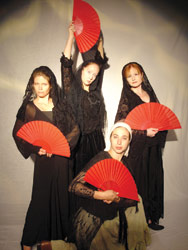Known for his participation in the pre-Spanish Civil War avant-garde movement, Federico Garcia Lorca was an emblematic writer, poet, painter and musician of the early 20th century. He wrote fearlessly about controversial issues such as homosexuality, the consequences of living under a dictatorship, the price of censorship and the class system defining his country. However, Lorca’s love for art and unwillingness to conform came at a dear cost. At the beginning of the Spanish Civil War, he was executed by Nationalist partisans—along with 4,000 artists of his generation—forever silenced by the regime of Francisco Franco.

A little more than 70 years later, the political and emotional world of pre-Civil War Spain is brought to the stage in Asheville Contemporary Dance Theatre’s version of La Casa de Bernarda Alba. The dance production, retold and reimagined from Lorca’s play, tells the story of four sisters confined to their home by their cruel and controlling mother.
Like the majority of Lorca’s work, La Casa de Bernarda Alba is drenched with metaphor that speaks about the politics of its time. The matriarch, Bernarda, forces her four daughters and servant to mourn the loss of her husband for seven years. The obvious parallels between Bernarda’s ironclad grip on her daughters and that of dictator Miguel Primo de Rivera (not to mention foreshadowing the Franco dictatorship) on Spain are hard to miss.
“We felt like revisiting this piece and tightening it up with [a stronger] focus on the dynamics between characters,” says ACDT’s Susan Collard. The choreographer and dancer (she plays the part of Bernarda) first staged this version of the play with transplanted Cuban dancer Nelson Reyes in 2006.
Collard describes the performance as rich with “complex relationships, undercurrents and subplots.” Of course, Lorca’s political metaphor still takes center stage.
“The way I see it, these women are imprisoned in their own home while the mother rules the house like a dictator,” Collard offers. “Whenever there are restrictions, whenever there’s a tyrant, there is tragedy. Lorca placed this at the center of his story. This family of girls is complex, with emotional highs and lows, and fierce rivalry. And [trapped] together in a state of mourning, problems abound.”
The only male dancer in the performance is Giles Collard, Susan’s husband, who will be dancing the part of the family’s crazy grandmother, an elderly woman who desperately believes she is a teenager preparing to marry her true love. Grandma, the one character who openly receives love and warmth from Bernarda, provides comic relief in a story riddled with pain, darkness and despair.
Staying true to the fashion of 1920s Spain, all the dancers will be wearing Spanish shawls and black dresses lined with petticoats, and will be dancing with fans (all except for Grandma, who will be clad in nothing but white). High-heeled shoes will create musical rhythms as the dancers travel across the stage, blending principles of modern dance with flamenco. An eclectic array of Spanish music selected by Tony Saldana, the company’s musical director, will also be featured.
Though La Casa de Bernarda Alba is a challenging story to express through dance, the dancers think they are up to the challenge. As Susan Collard exclaims, “Be prepared to be stimulated with fast, dramatic and well-choreographed dance.”
who: Asheville Contemporary Dance Theatre presents La Casa de Bernarda Alba
what: A Spanish political allegory told through dance
where: BeBe Theatre
when: Thursday, May 29, through Sunday, June 1 ($17/$12 students and seniors. www.acdt.org or 254-2621)


Before you comment
The comments section is here to provide a platform for civil dialogue on the issues we face together as a local community. Xpress is committed to offering this platform for all voices, but when the tone of the discussion gets nasty or strays off topic, we believe many people choose not to participate. Xpress editors are determined to moderate comments to ensure a constructive interchange is maintained. All comments judged not to be in keeping with the spirit of civil discourse will be removed and repeat violators will be banned. See here for our terms of service. Thank you for being part of this effort to promote respectful discussion.